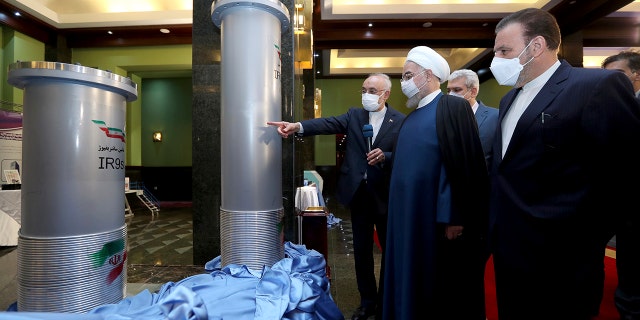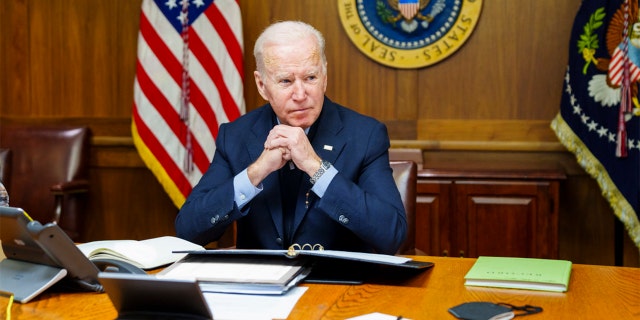NEWYou can now listen to Fox News articles!
The Middle East has taken center stage this week as oil prices continue to skyrocket and western nations look to boycott Moscow over its deadly invasion into Ukraine.
But the Biden administration’s attempts to garner support from oil-rich nations to assist Ukraine and counter prices at the pump has been met with resistance, the result of what some argue is long-standing mistrust of the U.S. from nations like Saudi Arabia and the United Arab Emirates (UAE).
According to recent reports, President Biden was rebuffed by the two nations’ leaders when he attempted to arrange calls with Saudi Crown Prince Mohammed bin Salman and the UAE’s Sheikh Mohammed bin Zayed Al Nahyan.
The White House National Security Council (NSC) pushed back hard on the reports, with spokesperson Emily Horne telling Fox News, “This is a mischaracterization and does not reflect reality. There are no rebuffed calls, period.”
RUSSIA INVADES UKRAINE: LIVE UPDATES
In addition, Secretary of State Antony Blinken last week downplayed the suggestion that the Biden administration was snubbed by oil-leading nations in the Middle East saying, “We’re all talking regularly.”
However, the complex relationship between the U.S. and the oil-rich Gulf nations dates back decades and has been influenced by geopolitical policies relating to everything from oil embargoes in the 1970s to the suspension of arms amid the ongoing crisis in Yemen.
In this photo provided by the Saudi Royal Court, Saudi Arabia’s Crown Prince Mohammed bin Salman, right, welcomes Qatar’s Emir Sheikh Tamim bin Hamad al-Thani upon his arrival to attend the Gulf Cooperation Council’s 41st Summit in Al-Ula, Saudi Arabia, Jan. 5, 2021.
(Saudi Royal Court via AP)
“In the Middle East, and specifically in Arab society, relationships matter. The last thing you want to be is a fair-weather friend,” Michael Rubin, a former Pentagon official who advised the military on matters relating to Iran and Iraq under the George W. Bush administration, told Fox News Digital.
“And from the very start, [Team] Biden defined themselves as a fair-weather friend.”
Upon entering office, President Biden vowed to not only end the war in Yemen, which has resulted in one of the largest humanitarian crises in the world with hundreds of thousands killed and millions displaced, but said he would stop supplying arms to Saudi Arabia.
The war in Yemen kicked off in 2014 when Shia Houthi rebels backed by Iran attempted to overthrow the government.
By 2015, under Barack Obama, the U.S. began arming Sunni Arab states like Saudi Arabia and the UAE, which have backed the Yemeni government. But mass causalities and the humanitarian crisis prompted the U.S. to limit its military support to the Saudi campaign in 2016.
IRAN NUCLEAR TALKS SCREECH TO A HALT AMID NEW RUSSIAN DEMANDS
This decision was reversed in 2017 under the Trump administration, and U.S. arms sales to Saudi Arabia increased by more than 40%, according to the Stockholm International Peace Research Institute arms transfer database.
Biden’s administration largely reflects that of the Obama White House to include Domestic Policy Council Director Susan Rice, Secretary of State Antony Blinken, Director of National Intelligence Avril Haines and NSC Adviser Jake Sullivan. The president has also said he would revert to policies held by the previous Democratic administration.
The White House did not respond to Fox News Digital’s request for comment on the nature of the former Obama administration and current Biden administration officials’ relationships with the oil-rich Middle Eastern country leaders.

In this July 30, 2018, file photo, a 17-year-old boy holds his weapon at the dam in Marib, Yemen.
(AP Photo/Nariman El-Mofty, File)
“This war has to end,” Biden said in a February 2021 address. “And to underscore our commitment, we’re ending all American support for offensive operations in the war on Yemen, including relevant arms sales.”
Biden later frustrated members of his own party with a November decision to sell $650 million in defensive aid to the Saudi government as it continues to get pummeled by Houthi forces.
The administration justified its move by saying it will continue to prioritize human rights while working with important partners in the region.
But some foreign policy experts have argued that the tumultuous U.S. relationship with the Gulf states is rooted in decisions made during the Obama administration when then-National Security Advisor Susan Rice prioritized human rights over geopolitical ties.
BLINKEN DOWNPLAYS REPORTS OF SAUDI, UAE DISTRUST OF BIDEN ADMIN
“There’s an element of where there’s smoke there’s fire,” Rubin told Fox News Digital. “The Saudis wouldn’t be the first to complain about Susan Rice.”
Rubin argued that while several of Rice’s decisions in the Middle East put a bad taste in the mouth of Gulf nations, “I don’t think it can be nailed to just one person.”
“You’ve got a situation where progressives may want to apply pressure to Abu Dhabi and Riyadh because of human rights violations, but they really need to take a step back and consider whether we would be throwing out the baby with the bathwater,” Rubin added. “Because if we force the Saudis and the Emirates into the arms of Beijing, it’s going to be a lot harder advocating for human rights than it is now.”
BARR WARNS CHINA IS ‘BIGGEST THREAT’ TO US, WARNS OF ‘HIGHLY AGGRESSIVE’ TECH PLAN
China’s grip in the Middle East has increased in recent years as relations with the West have strained.
Though some relations were improved under the Trump administration’s Abraham Accords, which normalized ties between Israel and Muslim nations like Bahrain, the UAE, Morocco and Sudan, Beijing’s influence in the region remained.
“This is a systematic problem in Washington. We tend to conceive of our relations as always bilateral,” said Rubin, who is also a senior fellow with the American Enterprise Institute. “But we’re not the only players in the sandbox.”
“This isn’t just a Democrat or Republican thing.”
GOP SENATORS SLAM BIDEN FOR WORKING WITH RUSSIA ON IRAN DEAL DURING UKRAINE INVASION: ‘INSANE’
Saudi Arabia backed the U.S. war in Afghanistan after 9/11 and later during the Iraq war, but Rubin argued that there was a level of disregard toward Saudi concerns during the George W. Bush administration.
“The Saudis were afraid for sectarian reasons that we were going [to] … basically open Pandora’s box and, to some extent, they were right,” Rubin said. “At the same time, under Obama, the Saudis believe that we were not taking seriously their concerns vis-a-vis Iran. And remember today that they’re getting hit by Iranian drones that are being flown from Iraq, are being flown from Yemen.”
U.S. relations with Iran have also drastically affected U.S. ties with other top players in the region.

President Hassan Rouhani, second right, listens to head of the Atomic Energy Organization of Iran Ali Akbar Salehi while visiting an exhibition of Iran’s new nuclear achievements in Tehran, Iran, in April.
(Iranian Presidency Office/AP)
Saudi Arabia and the UAE strongly opposed the nuclear deal established by then-Secretary of State John Kerry with Iran in 2015.
Donald Trump on the campaign trail vowed to abandon the Joint Comprehensive Plan of Action (JCPOA) and eventually pulled the U.S. out of the agreement in 2018.
Following Iran’s advancing nuclear program, the UAE and Saudi governments have said they back the Biden administration’s attempts to end Iran’s nuclear program but have demanded to be involved in this round of negotiations and have called for stronger parameters from Tehran.
“Saudi Arabia is not interested in hindering or blocking the current negotiations … It is interested in ensuring their success in achieving effectively the desired results,” Saudi Ambassador to the U.S. Rayd Krimly said in April 2021 as the Biden White House looked to restart negotiations with Iran.

President Biden is seen at Camp David in Maryland during a phone call with Russian President Vladimir Putin Feb. 12, 2022.
(White House)
The U.S. has looked to Saudi Arabia and the UAE to boost oil production as the U.S. and its Western allies have taken steps to boycott Moscow oil amid Russian President Vladimir Putin’s war in Ukraine.
CLICK HERE TO GET THE FOX NEWS APP
The UAE said last week that it supports increasing oil production to alleviate strains on the global market, but it remains unclear if it will be able to convince the Saudi-led Organization of the Petroleum Exporting Countries (OPEC) to adhere to U.S. pleas.
“These countries have long memories,” Rubin said. “So to mistreat the Saudis and not expect that there would be a response is wishful foolishness.”